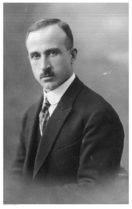Politis–Kalfov Protocol
The Politis–Kalfov Protocol (Bulgarian: Спогодба „Калфов-Политис“; Greek: Πρωτόκολλο Πολίτη - Καλφώφ) was bilateral document signed at the League of Nations in Geneva in 1924 between Greece and Bulgaria and was concerning the “protection of the Bulgarian Minority in Greece.” However it was not ratified by the Greek side.[1]
History[]
After the Tarlis incident in which 17 Bulgarian peasants were killed by a Greek soldier on July 27, 1924, near the , tensions between the two countries increased. As result on 29 September, 1924 a protocol was signed at the League of Nations in Geneva by Nikolaos Politis and , concerning the “Protection of the Bulgarian minority in Greece.” This agreement constituted the first official acknowledgement by Greece that a Bulgarian minority existed there. The Bulgarian National Assembly quickly ratified it in October. The protocol obliged Greece to treat all members of this minority according to the terms of the Treaty of Sevres. Greek side agreed to sponsor Bulgarian minority schools; to allow the presence of Exarchist priests if they obtained Greek citizenship and to open a minority affairs bureau in Thessaloniki, to administer minority rights. Meanwhile, in Greece internal reaction against the Protocol arose, because public opinion stood against the recognition of any “Bulgarian” minority in Northern Greece. Belgrade also was suspicious of Greece's recognition of a Bulgarian minority and was annoyed this would hinder its policy of forced “Serbianisation” in Serbian Macedonia.[2] On February 2, 1925, the Greek Parliament, claiming pressure from the Kingdom of Yugoslavia, which threatened to renounce the Greek–Serbian Alliance of 1913, refused to ratify the agreement. On 29 May 1925 the Greek government maintained that Greece was open to any suggestions concerning the “Slavic-speaking linguistic minority” but that the existence of an ethno-religious, i.e. Bulgarian Exarchist minority was completely unacceptable.[1]
See also[]
References[]
- ^ Jump up to: a b Michailidis, Iakovos D. (1996). "Minority Rights and Educational Problems in Greek Interwar Macedonia: The Case of the Primer "Abecedar"". Journal of Modern Greek Studies. 14 (2): 329–343..
- ^ Michailidis, Iakovos D. (1995). "Traditional Friends and Occasional Claimants: Serbian Claims in Macedonia between the Wars". Balkan Studies. 36: 112..
- Bulgaria–Greece relations
- 1924 in Greece
- 1924 in Bulgaria
- 1924 in international relations
- Ethnic groups in Greece
- Treaties of the Second Hellenic Republic
- Treaties of the Kingdom of Bulgaria
- Unratified treaties

